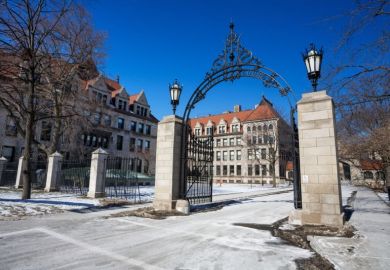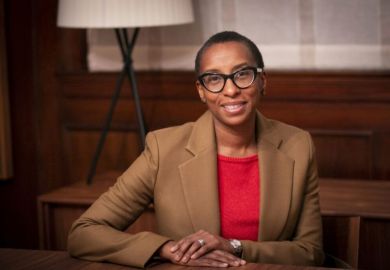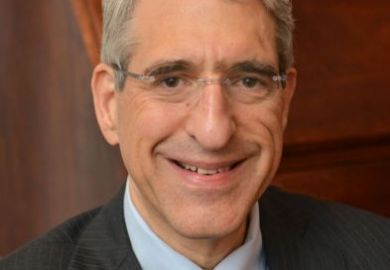Martha Pollack has announced her retirement from the presidency of Cornell University, becoming the third Ivy League leader to step down since the outbreak of pro-Palestinian student protests put heavy political pressure on the nation’s higher education establishment.
The Cornell president – a professor of computer science, information science and linguistics – said that she had been regularly contemplating the move since December, when students criticising Israel’s military assault on Gaza occupied a central administration building and staged a mock trial that accused her of complicity due to Cornell’s academic collaborations with Israel.
In an announcement addressed to her campus community, Professor Pollack offered no specific reason for her decision to retire after seven years of leading Cornell.
But she noted the student protests engulfing dozens of US campuses including her own, saying that the violence in Israel “has raised a number of critical issues that we are all grappling with, from antisemitism, Islamophobia, and other forms of bigotry, to free expression, academic freedom, and how to foster a diverse, equitable, and inclusive community”.
At many of the nation’s colleges and universities, institutional leaders have been caught between their stated commitment to free expression and a drumbeat of demands from national political leaders to silence criticisms of the Israeli military attacks that have killed some 35,000 civilians in Gaza since Hamas forces in early October slaughtered about 1,100 people in Israel.
Increasingly, though, US college and university presidents have moved in the direction of suspending students, and letting police arrest them, despite indications that the protests on behalf of Palestinian civilians – even multi-day tent encampments on campus lawns – had largely remained peaceful.
Such use of police force is driving a rising number of recent cases in which faculty have voted no-confidence in their campus leaders. They include Emory University, New York University, Indiana University Bloomington, the University of Kentucky, Barnard College and – just ahead of Professor Pollack’s resignation – the University of Southern California. Faculty at the University of California, Los Angeles were considering a similar move this week.
Cornell under Professor Pollack refrained from using police, but it did suspend six student demonstrators despite their protests remaining peaceful and located on grounds away from classrooms. The university argued that the suspended students had engaged in “unreasonably loud chants and behaviour” as part of their encampments.
The 65-year-old president said in her announcement that she decided, “after extensive reflection”, that she will retire at the end of June. She said she began considering the idea in the autumn semester, then “made the decision over the December break; but three times, as I was ready to act on it, I had to pause because of events on our and/or on other campuses”.
She said she pushed ahead now to avoid overshadowing commencement and “because of the need to have sufficient time for a smooth transition before the start of the coming academic year”. Yet Cornell said that its provost, Michael Kotlikoff, will serve as interim president for two years, with plans to begin searching for a permanent replacement “six to nine months prior to the end of Mike’s term”.
Two other female Ivy League presidents – Claudine Gay of Harvard University and Elizabeth Magill of the University of Pennsylvania – resigned in recent months after Republican members of Congress and leading institutional donors accused them of being too lenient with students protesting against Israel’s killing of Palestinian civilians.
Yale University also is seeking a replacement for Peter Salovey, who announced at the beginning of the current academic year that he would step down as president at the end of it.
The chair of Cornell’s board of trustees, food industry executive Kraig Kayser, in his announcement of Professor Pollack’s resignation, credited her with “promoting thoughtful dialogue and condemning hate”, saying: “Her commitment to free expression and academic freedom has been a constant during her presidency.”
Mr Kayser also said that her tenure would be marked by major expansions in research expenditures and aid to needy students, and new academic initiatives that include a School of Public Policy, a Digital Agriculture programme, and a Department of Design Tech.
Register to continue
Why register?
- Registration is free and only takes a moment
- Once registered, you can read 3 articles a month
- Sign up for our newsletter
Subscribe
Or subscribe for unlimited access to:
- Unlimited access to news, views, insights & reviews
- Digital editions
- Digital access to THE’s university and college rankings analysis
Already registered or a current subscriber? Login








